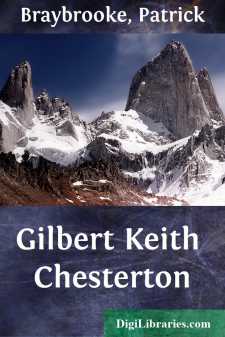Categories
- Antiques & Collectibles 13
- Architecture 36
- Art 48
- Bibles 22
- Biography & Autobiography 813
- Body, Mind & Spirit 142
- Business & Economics 28
- Children's Books 16
- Children's Fiction 13
- Computers 4
- Cooking 94
- Crafts & Hobbies 4
- Drama 346
- Education 46
- Family & Relationships 57
- Fiction 11829
- Games 19
- Gardening 17
- Health & Fitness 34
- History 1377
- House & Home 1
- Humor 147
- Juvenile Fiction 1873
- Juvenile Nonfiction 202
- Language Arts & Disciplines 88
- Law 16
- Literary Collections 686
- Literary Criticism 179
- Mathematics 13
- Medical 41
- Music 40
- Nature 179
- Non-Classifiable 1768
- Performing Arts 7
- Periodicals 1453
- Philosophy 64
- Photography 2
- Poetry 896
- Political Science 203
- Psychology 42
- Reference 154
- Religion 513
- Science 126
- Self-Help 84
- Social Science 81
- Sports & Recreation 34
- Study Aids 3
- Technology & Engineering 59
- Transportation 23
- Travel 463
- True Crime 29
Gilbert Keith Chesterton
Categories:
Description:
Excerpt
Preface
It is certain that up to a point in the evolution of Self most people find life quite exciting and thrilling. But when middle age arrives, often prematurely, they forget the thrill and excitements; they become obsessed by certain other lesser things that are deficient in any kind of Cosmic Vitality. The thrill goes out of life: a light dies down and flickers fitfully; existence goes on at a low ebb—something has been lost. From this numbed condition is born much of the blind anguish of life.
It is one of the tragedies of human existence that the divine sense of wonder is eventually destroyed by inexcusable routine and more or less mechanical living. Mental abandon, the exercise of fancy and imagination, the function of creative thought—all these things are squeezed out of the consciousness of man until his primitive enjoyment of the mystical part of life is affected in a very serious way.
Nothing could be more useful, therefore, than to write a book about a man who has done more than any other living writer to stimulate and preserve the primitive sense of wonder and joy in human life. Gilbert Keith Chesterton has never lost mental contact with the cosmic simplicity of human existence. He knows, as well as anybody has ever known, that the life of man goes wrong simply because we are too lazy to be pleased with simple, fundamental things.
We grow up in our feverish, artificial civilization, believing that the real, satisfying things are complex and difficult to obtain. Our lives become unnaturally stressed and tormented by the pitiless and incessant struggle for social conditions which are, at best, second-rate and ultimately disappointing.
G. K. Chesterton would restore the primitive joys of wonder and childlike delight in simple things. His ideal is the real, not the merely impossible. Unlike most would-be saviours of the race, he seeks not to merge a new humanity into a brand new glittering civilization. He would have us awaken once more to the ancient mysteries and eternal truths. He would have us turn back in order to progress.
Science makes us proud, but it does not make us happy. Efficiency makes us slaves—we have forgotten the truth about freedom. Success is our narcotic deity, and weans more men into despair than failure; for, as G.K.C. has said, 'Nothing fails like Success.' We have yet to rediscover the spiritual health that comes with a clear recognition of the part that life cannot be great until it is lived madly and wildly. We have to learn all over again that grass really is green, and the sky, at times, very blue indeed.
ARTHUR F. THORN(Author of 'Richard Jefferies'),
Assistant-Director of Studies,
London School of Journalism.
This book is the outcome of many and repeated requests to the author to write it. While realizing the difficulties involved, he feels that the opportunities he has enjoyed give him at least some qualifications for the task, for not only is he a kinsman of Mr. Chesterton, but also has spent much time in his company.
The book aims to be a popular study of the Writer and the Man....


